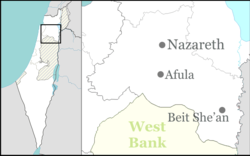Zarzir (Arabic: زرزير, Hebrew: זַרְזִיר), also known as Beit Zarzir, is an Arab local council located 10 kilometres (6.2 mi) west of the city of Nazareth in the Northern District of Israel. In 2022 it had a population of 8,565,[1] consisting of five Bedouin tribes, Mazarib, Grifat, Haib, Jawamis, and Eyadat.
Zarzir
| |
|---|---|
Local council (from 1997) | |
| Hebrew transcription(s) | |
| • ISO 259 | Zarzir |
| • Also spelled | Bet Zarzir (official) |
 Council headquarters | |
| Coordinates: 32°43′38″N 35°13′29″E / 32.72722°N 35.22472°E | |
| Country | |
| District | Northern |
| Area | |
• Total | 3,889 dunams (3.889 km2 or 1.502 sq mi) |
| Population (2022)[1] | |
• Total | 8,565 |
| • Density | 2,200/km2 (5,700/sq mi) |
Service in the IDF
editA few kilometres away, at HaMovil Junction, there is a memorial to the Bedouin soldiers of the IDF fallen since 1948, 230 of them by 2022.[2] The Monument to the Bedouin Soldier (sometimes translated a Fighter or Warrior), established at a site close to Bedouin and other Israeli Arab towns, was inaugurated on Independence Day in 1993 by then-Prime Minister Yitzhak Rabin.[2] The memorial includes a museum of Bedouin heritage and a garden with medicinal herbs.[2]
On June 6, 2024, during the Hamas-Israel war, an IDF soldier from Zarzir was killed in action in the Gaza Strip by Hamas gunmen who were trying to infiltrate through the border fence into Israel. Warrant Officer Zeed Mazarib, 34, was part of a force of Bedouin trackers from the Desert Reconnaissance Battalion sent to intercept the Hamas cell.[3]
See also
editReferences
edit- ^ a b "Regional Statistics". Israel Central Bureau of Statistics. Retrieved 21 March 2024.
- ^ a b c Monument Honors Fallen Bedouin Soldiers of Israel. Lydia Aisenberg for ESRAmagazine, 21 February 2022. Accessed 6 June 2024.
- ^ IDF strikes school in central Gaza where it says dozens of terrorists were gathered, Emanuel Fabian for Times of Israel, posted & accessed June 6, 2024.
Dr. Tomer Mazarib, The Integration Process of the Bedouin population into Arab Villages and Towns in the Galilee: Historical, Social and Cultural Aspects from the beginning of the 18th Century to the end of the 20th Century (Haifa: University of Haifa Press, 2016).
External links
edit
